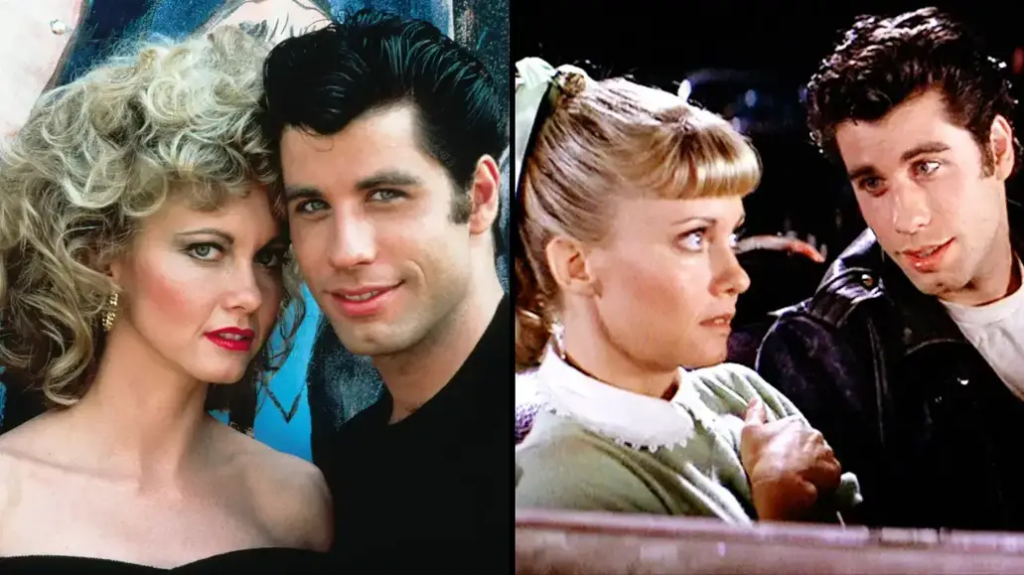Over four decades after its release, the iconic 1978 musical Grease is facing harsh criticism from modern audiences, with many viewers now calling it “sexist,” “misogynistic,” and “problematic.”
The film, which has long been a beloved classic, is filled with memorable musical numbers, vibrant performances, and an undeniable charm that has helped it maintain its status as one of the most recognizable musicals of all time. Starring John Travolta and Olivia Newton-John, the movie tells the story of two teenagers who share a romantic summer together, believing they’ll never meet again—only to unexpectedly find themselves attending the same high school the following year.

Upon its initial release, the film was a runaway success, grossing an estimated $396 million worldwide against a modest $6 million budget. Over time, it has been preserved in the National Film Registry, securing its place as one of the most influential musical films ever made.
However, as society has evolved and conversations around gender roles, consent, and representation have shifted, Grease is now being scrutinized through a modern lens—and not everyone is happy with what they see.
Modern Audiences Are Calling Out ‘Problematic’ Themes in Grease
Many viewers have taken to social media to share their changed perspectives on the film, expressing their discomfort with certain scenes and lyrics that they believe haven’t aged well.
One Twitter user wrote:
“I used to absolutely love Grease as a kid, but watching it now? It’s just way too problematic. It makes me cringe so much.”
Another viewer, revisiting the film after several years, expressed deeper concerns:
“I grew up watching this movie on repeat. Now that I’ve seen it again, it’s even worse than I remember. Misogyny, toxic masculinity, r** culture, and straight-up p***philia. How did we not see this before?”
One of the most controversial lines comes from the song “Summer Nights,” when Danny’s friends ask him about his summer romance with Sandy, and one of them chimes in with the lyric:

“Did she put up a fight?”
For many, this line casts a dark shadow over the entire movie, with some arguing that it romanticizes coercion and suggests that Danny may have pressured Sandy into something she wasn’t comfortable with.
One social media user commented:
“That one line—‘Did she put up a fight?’—completely ruins Grease for me. It makes me feel sick every time I hear it.”
Other Scenes That Are Being Called Out
Beyond the song lyrics, modern audiences have pointed out several moments in the film that they now see as highly problematic.
- A scene where one of the T-Birds lifts up a girl’s skirt without her consent.
- The infamous drive-in movie scene, where Danny tries to force himself onto Sandy despite her clear discomfort.
- The lack of racial diversity, which has become more glaringly obvious as Hollywood faces continued calls for better representation.
A particularly frustrated viewer posted:
“How did we not notice how creepy and predatory some of these scenes were? The drive-in scene is literally a guy ignoring every single signal a girl is giving him, and somehow, we were all okay with that?”
Another agreed:
“I loved Grease as a teenager, but looking at it now? It’s a giant pile of misogynistic c**.”*

Were the Cast Members Too Old for Their Roles?
Another issue that has resurfaced is the age of the actors compared to the characters they played.
While Grease is a high school story, many of its main characters were portrayed by actors who were well into their late twenties or thirties.
- Olivia Newton-John, who played Sandy, was 29 years old when the movie was filmed—even though her character was supposed to be 17 or 18.
- Stockard Channing, who played Betty Rizzo, was 33 years old, despite Rizzo being portrayed as a high school senior.
While this wasn’t unusual for films at the time, it has become more noticeable with modern audiences, leading some to criticize Hollywood’s long history of casting much older actors as teenagers.
Defending Grease: Some Fans Argue It’s Just a Product of Its Time
Despite the backlash, Grease still has plenty of supporters who argue that the film should not be judged by today’s cultural standards.
Even Olivia Newton-John herself, before her passing, spoke out against the criticism. In a 2020 interview, she dismissed the idea that Grease was offensive, saying:
“It’s a movie. It’s a story from the 50s where things were different. People forget that at the end, Danny changes for her too.”
She added:
“There’s nothing deep in there about the #MeToo movement. It’s just a girl who loves a guy, and she thinks if she changes a little, he’ll like her more. And he thinks if he changes a little, she’ll like him more. That’s actually pretty real—people do that for each other all the time. It was just a fun love story.”
Other fans echo this sentiment, arguing that films from the past shouldn’t be “canceled” simply because modern perspectives have evolved.
One fan commented:
“Not offended by Grease, nor do I think it should be banned or anything, but I do see how some parts haven’t aged well. There are moments that definitely make me uncomfortable now.”

Can Grease Survive Today’s Changing Cultural Standards?
The controversy surrounding Grease highlights a larger debate about older films and their place in modern culture.
Some argue that movies like Grease should be left as they are, while others believe that revisiting and discussing problematic elements is necessary for cultural progress.
Regardless of where people stand, one thing is certain—45 years after its release, Grease is still making headlines.
Whether viewed as a beloved musical classic or a film with outdated and problematic elements, the ongoing conversation proves that Grease remains one of the most talked-about films of all time.